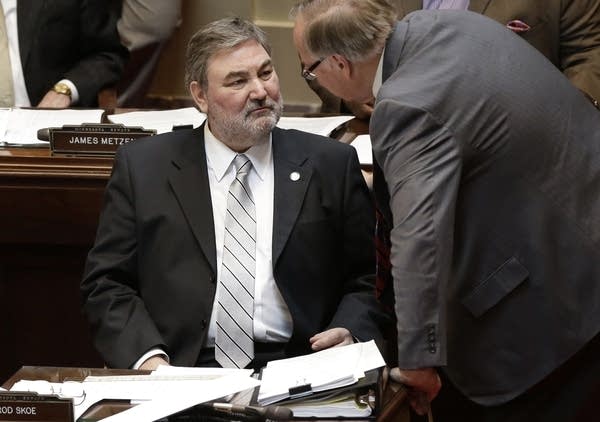Republicans take full control of Minnesota Legislature

Go Deeper.
Create an account or log in to save stories.
Like this?
Thanks for liking this story! We have added it to a list of your favorite stories.
Updated: Nov. 9, 2016 @ 3:30 a.m. | Posted: Nov. 8, 2016 @ 9:38 p.m.
Minnesota voters Tuesday put the Minnesota House and Senate squarely in the hands of Republicans, building a formidable opposition in the last years of DFL Gov. Mark Dayton's term.
The Republican wave that poured over Minnesota and across the nation on Election Day appeared to buoy local GOP candidates in greater Minnesota and in congressional races.
Turn Up Your Support
MPR News helps you turn down the noise and build shared understanding. Turn up your support for this public resource and keep trusted journalism accessible to all.
Health insurance cost concerns may have also played a role in the GOP's strength. Some analysts believed voters went Republican to send a message of unhappiness over big projected jumps in health coverage costs for people who buy coverage outside of an employer.
The cost anger — a byproduct of the federal Affordable Care Act championed by President Barack Obama and embraced in Minnesota by Gov. Mark Dayton and other DFL leaders — may have been a tipping point in some greater Minnesota legislative races, said MPR News political analyst Todd Rapp.

"People are not just angry, they are off the charts on fire angry, and rightfully so," said state Rep. Josh Heintzeman, R-Nisswa, adding that health care was the biggest issue on voters' minds. "They were promised a lot, and the Affordable Care Act did not deliver."
Job One next year at the Legislature in St. Paul will be to "do everything we can as a state to see if some of those mistakes that were made can be fixed," he said.
All 201 Minnesota legislative seats were up for grabs Tuesday. Here's a look at some of the races that made for a long night and early morning in Minnesota.
Minnesota House
Republicans held a 12-seat advantage over Democrats, 73 to 61, in the Minnesota House before Election Day. Democrats needed to gain seven seats to win majority control. But it was clear early in the evening that it wasn't going to happen.
Minnesota House Speaker Kurt Daudt, R-Zimmerman, said the Republican muscle in the House was evidence that "Minnesotans soundly rejected" DFL Gov. Mark Dayton's push for a united DFL government.
History was also made another way Tuesday in the House.
In District 60B, which includes parts of the Cedar-Riverside neighborhood, southeast Minneapolis and the University of Minnesota, Minneapolis organizer Ilhan Omar won election and will become the nation's first Somali-American legislator.
The seat was represented for decades by DFLer Phyllis Kahn. Omar defeated Kahn in a primary contest as Kahn was seeking her 22nd term in the Minnesota House.
Minnesota Senate
Democrats had held a 10-seat advantage over Republicans in the Senate, 38 to 28 with one vacant seat. Republicans needed to gain six seats to take control of the body.

By early Wednesday morning, DFL Party Chair Ken Martin conceded Democrats were "fighting for dear life" to hang on to the Senate.
Hours later, Republicans tipped control their way.
One key northwest Minnesota DFLer, Senate Taxes Committee Chair Rod Skoe of Clearbrook, was losing badly to Republican Paul Utke with 75 percent of precincts reporting.
Skoe, one of the state Senate's most prominent Democrats, has said outside groups are targeting him with mailers, commercials and social media campaigns, including one that used an altered photo of him with gun-control advocate and former New York City Mayor Michael Bloomberg.

Trump's power, however, didn't extend into the Twin Cities suburbs.
DFLers scored a big victory by defeating Senate Republican Leader David Hann, R-Eden Prairie. Hann lost to DFLer Steve Cwodzinski, a recently retired high school civics teacher.
Throughout the race, Democrats tried to paint Hann as out of sync with his suburban district's voters on light rail transit and other issues.
Republicans picked up a Senate seat in the west metro relatively early in Tuesday night voting. Paul Anderson edged out DFLer Deb Calvert the district held by state Sen. Terri Bonoff, DFL-Minnetonka. Bonoff lost her race for Congress Tuesday against GOP U.S. House Rep. Erik Paulsen.
They also scored a victory in southern Minnesota where incumbent state Sen. Vicki Jensen, DFL-Owatonna, lost to Republican John Jasinski.
By early morning Wednesday the GOP found itself in striking distance of Senate control.
"Turnout looks solid to strong, so I think what's happening is that Donald Trump's pull in greater Minnesota has been more significant than Hillary Clinton's pull" in the Twin Cities area, said Rapp.


